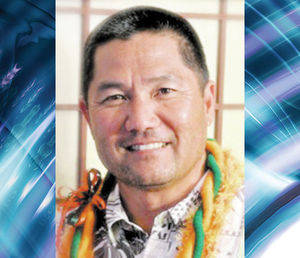LIHUE — The state of Hawaii’s pension plan is underfunded, and if the problem isn’t resolved the crisis could get worse.
That’s what Joseph Kent, vice president of research at the Grassroot Institute of Hawaii, told the Kauai County Council Wednesday as he presented a report he authored about the issue.
Currently, there’s about $12.9 billion missing from the pension fund, leaving state and county government retirees depending on a fund that is 46 percent empty, the report said.
“That means that for every dollar that we owe our public retirees at the county or state level, we only have about 54 cents,” he told The Garden Island.
One of the solutions would be to create a new public pension plan that would reduce, and ideally eventually eliminate, the state’s public pension debt while offering more flexibility for the government employees the system is supposed to benefit, the report says.
The plan also over-promises and under-delivers, he said.
“We pay more attention to the money that we’re promising going out rather than paying attention to the money that’s coming in and matching that to the money going out and that makes another debt problem,” Kent said.
Another reason the pension plan is underfunded is because of pension spiking, and one thing that could make a difference is to divorce spiking from the pension calculation, he said.
Pension spiking is when an employee works overtime near the end of his or her government career and thereby increases their annual income for those final few years. Retirement pensions are based on average annual incomes and years of service, so spiking income in the final years of a career increases a retiree’s pension amount.
In some cases, an employee can be making $30,000 or $40,000 per year just in overtime, which raises their retirement pay.
“If you get overtime, or sick pay or vacation pay, employees are able to calculate that into their pension calculation, and if you can spike your pay you can spike your pension, and that creates a big problem,” he said
Kent said Kauai County has the highest salaries on average compared to the rest of the counties, and there’s a lot of overtime given here, he said.
“Sometimes $30,000, sometimes $40,000 in overtime. When you combine that (hourly wages) with overtime, sometimes, some employees are making close to $100,000 a year. Not all employees are making that, but some employees are, and the question is ‘Who are these employees and why are they making so much?’” he said.
Sometimes overtime is necessary, he said.
“For example, during a hurricane, and I know you folks had some emergency overtime that was needed recently, but other times there are ways to abuse the overtime system and we want to stop the bad overtime and keep the good overtime,” Kent said.
What spiking means for the people of Kauai is that every time a tax increases it increases taxpayer contributions.
“That means that the $8 million that’s required by the county every year extra is money that could have been used for homelessness, housing or environmental causes, and it’s now just going to pay off the debt so it means county taxpayers are paying more but they’re getting less for their money,” he said.
Councilmember JoAnn Yukimura asked whether management of overtime under the present structure can solve the problem.
“I think you need to fix the mechanism that overtime is included into pension calculations. If that were fixed then you could just give overtime as needed. Sometimes you need overtime,” Kent said.
But since it is calculated into the pensions, the only way to manage it is to try to limit overtime, which may not be best for the county either, he said.
“At the very least, though, you can try,” Kent said. “Overtime abuse, which I’m told is a problem, there are ways to abuse it.”
Yukimura said that’s what she meant by overtime management. “You would stop the abuse,” she said.
The fact of the matter is the numbers look high, said Council Chair Mel Rapozo.
“A lot of the numbers may not reflect abuse. It reflects entitlements the state has agreed to,” he said. “That is the issue. I don’t want to paint this ugly black flower for our county safety people because they’re getting what they’re entitled to. The question is, ‘Are we doing our best job at the collective bargaining table?’”
When Vice Chair Ross Kagawa said that, when he was on Council Services staff, the highest-ranking police officers and firefighters were treated almost like management so they didn’t collect overtime.
“You took that high-management job with the higher salary and you left the overtime to the subordinates, so I don’t know what between 1995 and now something happened and they didn’t give up their overtime now, they can get both high salary plus,” he said.
Kent suggested creating a new pension plan based on best practices from other states, ensuring active employees wouldn’t have to worry about their benefits, and incentives to enroll in a new plan as possible solutions.






1. Eliminate the current state government pension program for all new hires starting in 2019. Replace with 401K type with some type of matching after 10 years.
2. Eliminate overtime as a calculation for pension payout now.
3. Someone have the leadership to say “NO TO OVERTIME”, unless a bona-fide emergency is declared by the Governor.
4. Use or lose sick days, vacation days, and comp days. You can only carry over 30 each year, and they cannot be used for pension calculation.
If you cannot do your job within the regular 40 hours per week, then maybe your supervisor needs to find someone that can. In the real world, if you are salary, then you stay till you have done your job.
98% of Government workers think they get paid for “going to work 8 hours a day”. WRONG: You are paid to perform.
The real question is where did that $12.9 billion pension funding go? Did another Neal Abricombie raid take place when some greedy politician decided to raid it for some pet project?
Then of course the abuse of overtime even during hurricane crisis where FEMA funds are used to pad the books on police and other county or State assistance as in the case of the Big Island where over $1 million of overtime was used for the lava flow area control. It is also a known fact that county workers often neglect in their daily duties such as cleaning out clogged drainage and wait for a storm to flood the area as in the case of Koloa so that FEMA funds could be abused for their overtime pension padding.
Do what most private industry has done and get rid of the pension system and instead utilize the stock market 401 K system. Then of course fire any employee both blue collar and management for cause thus automatically losing their pension and other benefits. No more let them stay on the payroll until they qualify for these benefits so that they get life pension payments while in jail.
All management positions should be re-evaluated and either cut from payroll or reduced significantly as in the case of the DOE where these useless “complex superindentents” are just another layer of bureacrats making more than the governor who are giving themselves a raise inspite of the fact Hawaii’s schools are ranked at the bottom of all 50 States!
Aloha Kakou,
Discussion points to one partial solution:
Emergency Overtime…yes.
But NO to letting those hours of Overtime accumulate towards Retirement.
Solved…!
In Emergency times, many people work tirelessly for the community without any pay..maybe that is another alternative. You are already paid well as a government worker, Emergency time is your turn to give…without extra or overtime pay.
Another bilking of the retirement systems that’s gotta stop is working for the fed or state or county government and after a mere 20 years of work you retire and go to work for either of the 2 other government agencies (like job swapping) and retire again after 20 more years, then work in the private sector until you qualify for 3 retirement checks, County, and State, and Social Security, and / or add a Federal retirement check.
Thus allowing calculating government workers quitting their jobs prematurely to win 3 retirement checks at retire age. Making more $$$ than they ever earned in their working life by just working the LOOP HOLES.
Most small business owners obligated to work overtime every day of their life and often at 7 days a week do not get these same government benefits, though in the long run they provided our community with same social benefits keeping their business open…well..for business, providing convenience to the general public day in and day out, including to the benefit of the government workers being paid extra for what the private sector is not paid.
Besides, the taxes of the private sector workers, pays the generous incomes of the government workers, all the while the private sector working people are getting paid less than the government workers.
The Social Security disaster is another whole fiasco…who can fix that…work your whole life for a retirement pay less than the cost of living? Isn’t that an Oxymoron.
And Washington D.C. is arguing over a Judge’s True or False youth parties 40 years ago? Mom always said it takes 2 to Tango or tangle.
Maybe the Judge is being used as a Red Herring to keep us from looking at the real issues.
Mahalo,
Charles